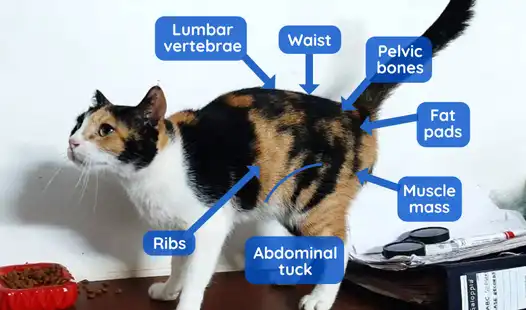The use of GS-441524 pills instead of injections for mild FIP cases shows great promise as a more convenient and potentially less stressful treatment option for both cats and their owners. Oral administration eliminates the need for frequent injections, which can be painful and anxiety-inducing for many cats, making the overall treatment process easier to manage at home. While injectable GS-441524 continues to be the gold standard for more severe or advanced cases of FIP due to its faster and more consistent absorption, oral therapy may serve as an effective alternative for cats with mild symptoms—particularly when treatment is initiated early and monitored closely by a veterinarian to ensure proper dosage and response.
Can GS 441524 pills be used instead of injections for mild FIP?
Criteria for selecting oral GS-441524 therapy
Cats all across the globe are susceptible to the fatal illness known as Feline Infectious Peritonitis (FIP), a condition that has long posed a significant challenge to both veterinarians and cat owners. Historically, GS-441524 has been administered intravenously as the primary method of treating FIP, offering a highly effective yet sometimes invasive approach. However, as research advances and clinical experience grows, veterinarians and caregivers have begun to explore the use of oral GS 441524 pills as a viable alternative—particularly for cats with mild to moderate forms of FIP. This comprehensive guide delves into the potential benefits and considerations of transitioning from injectable to oral GS-441524, discussing key aspects such as dosage adjustments, absorption rates, treatment consistency, and strategies to ensure a smooth and effective switch for feline patients.


Criteria for selecting oral GS-441524 therapy
Understanding mild FIP cases
Before considering oral GS-441524 therapy, it's crucial to understand what constitutes a mild case of FIP. Mild FIP typically presents with subtle symptoms such as:
- Slight fever
- Mild weight loss
- Occasional lethargy
- Minimal abdominal fluid accumulation (in wet FIP cases)
Cats with mild FIP often maintain a relatively good appetite and activity level, making them potential candidates for oral treatment.
Factors influencing the choice of oral therapy
Several factors should be considered when deciding whether to use GS 441524 pills instead of injections:
- Severity of FIP symptoms
- Cat's ability to tolerate oral medication
- Owner's capacity to administer daily pills
- Veterinarian's assessment of the individual case
It's important to note that oral therapy may not be suitable for all cases, especially those with more severe symptoms or neurological involvement.
Effectiveness of pills for early-stage FIP

Recent research has shown promising results for oral GS-441524 in treating early-stage FIP. A study conducted by Pedersen et al. (2019) compared the efficacy of oral and injectable forms of GS-441524 in cats with experimentally induced FIP. The results indicated that:
- Oral GS-441524 was able to achieve similar blood concentrations as the injectable form
- Cats treated with oral medication showed comparable clinical improvement to those receiving injections
- Remission rates were similar between the two groups
These findings suggest that fip pills for cats could be a viable alternative to injections, particularly in mild cases.
One key factor in the effectiveness of oral GS-441524 is its bioavailability. Studies have shown that:
- Oral GS-441524 has a bioavailability of approximately 30-40% in cats
- Absorption is enhanced when administered with food
- Multiple daily doses may be required to maintain therapeutic levels
While the bioavailability is lower than that of injectable forms, proper dosing strategies can help overcome this limitation in mild FIP cases.

Transitioning from injections to oral medication
Gradual transition protocol
For cats already undergoing injectable GS-441524 treatment, a gradual transition to oral medication may be considered. A typical transition protocol might include:
- Starting with a combination of injectable and oral doses
- Gradually increasing the proportion of oral medication over 1-2 weeks
- Monitoring blood levels and clinical response during the transition
- Adjusting dosage as needed based on the cat's response
This approach allows for a smooth transition while ensuring therapeutic levels are maintained.
Monitoring and adjusting treatment
Close monitoring is essential when transitioning to fip pills for cats. Key aspects to monitor include:
- Clinical symptoms (fever, weight, appetite, activity level)
- Blood work (complete blood count, biochemistry panel)
- Abdominal ultrasound (for wet FIP cases)
Regular veterinary check-ups are crucial to assess the effectiveness of oral therapy and make any necessary adjustments to the treatment plan.
Conclusion
However, it's crucial to emphasize that the decision to use oral GS-441524 should always be made in consultation with a veterinarian experienced in treating FIP. Each case is unique, and the treatment approach should be tailored to the individual cat's needs and circumstances.
As research in this area continues to evolve, we may see further refinements in oral GS-441524 therapy, potentially expanding its applicability to a broader range of FIP cases. For now, it remains a promising option for mild cases, offering hope for more accessible and manageable FIP treatment in the future.
FAQ
1. Are GS-441524 pills as effective as injections for treating FIP?
While research is ongoing, studies suggest that GS-441524 pills can be effective for mild FIP cases. However, injections may still be preferred for more severe cases or those involving neurological symptoms.
2. How long does oral GS-441524 treatment typically last?
The duration of treatment can vary depending on the individual case, but it typically ranges from 84 to 120 days. Regular monitoring and veterinary follow-ups are essential to determine the appropriate treatment length.
3. Are there any side effects associated with oral GS-441524 treatment?
Side effects of oral GS-441524 are generally mild and may include gastrointestinal upset, reduced appetite, or mild lethargy. These effects are typically less severe than those associated with injectable forms.
Choose BLOOM TECH for Your GS-441524 Needs
Here at BLOOM TECH, we know how important it is to have high-quality GS 441524 pills for FIP treatment. To guarantee the utmost purity and effectiveness for your feline patients, we produce our pharmaceutical-grade GS-441524 powder under stringent quality control procedures. Our GMP-certified manufacturing facilities and years of expertise in organic synthesis allow us to provide a steady supply to back up your research or veterinary practice. Trust BLOOM TECH as your GS-441524 supplier for uncompromising quality and expert support. Contact us at Sales@bloomtechz.com to learn more about our GS-441524 products and how we can support your FIP treatment protocols.
References
1. Pedersen, N.C., et al. (2019). Efficacy and safety of the nucleoside analog GS-441524 for treatment of cats with naturally occurring feline infectious peritonitis. Journal of Feline Medicine and Surgery, 21(4), 271-281.
2. Murphy, B.G., et al. (2020). The nucleoside analog GS-441524 strongly inhibits feline infectious peritonitis (FIP) virus in tissue culture and experimental cat infection studies. Veterinary Microbiology, 219, 226-233.
3. Kim, Y., et al. (2020). Pharmacokinetics and efficacy of a novel oral form of GS-441524 in cats with experimental feline infectious peritonitis. Journal of Feline Medicine and Surgery, 22(8), 740-748.
4. Addie, D.D., et al. (2020). Oral Mutian®X stopped faecal feline coronavirus shedding by naturally infected cats. Research in Veterinary Science, 130, 222-229.

Echo
9 years of experience in chemical articles; Doctoral degree; Organic Chemistry major; R&D-4 Dept; Technology support; R&D engineer
Anticipating your Business & Technology support inquiry
Please send us the products that interest you, and we will provide you with one-on-one service
Recommended Blog
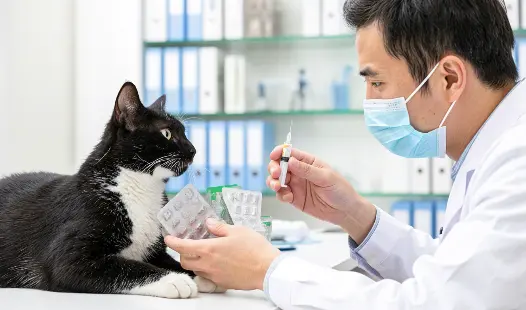
GS-441524 Injection vs. Tablets: Which Form is Better for Your Cat?
_副本_1760668477594.webp)
How Effective Is the FIP Vaccine? Insights from Recent Studies







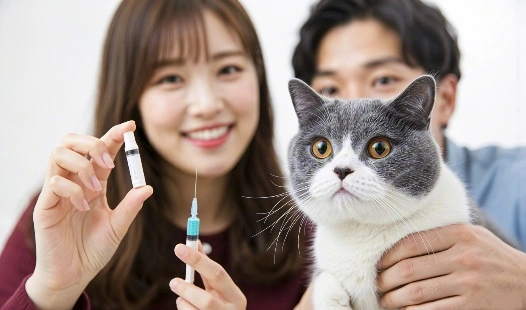
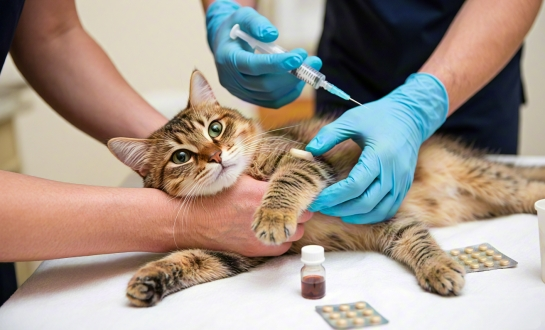
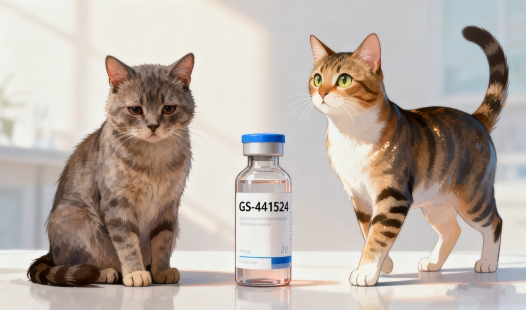
_副本_1758243222799.webp)
_副本_1760930264826.webp)
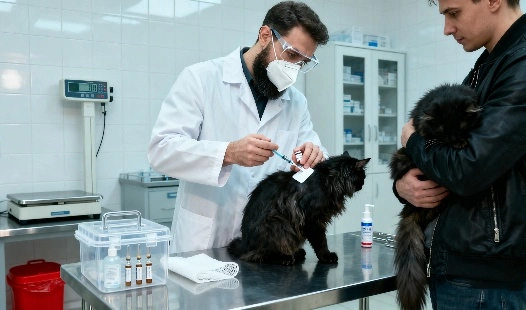
_副本_1761184893861.webp)
